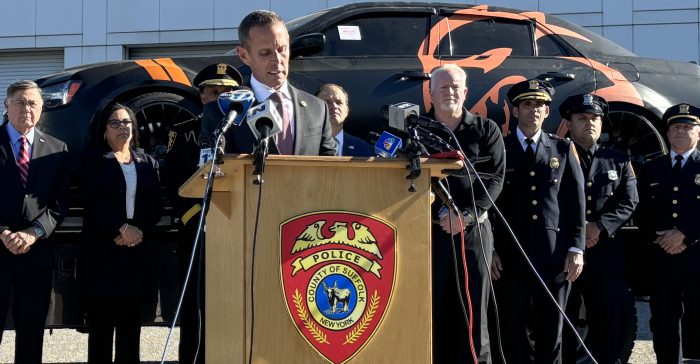 The Mainline Mayors coalition, who represent municipalities with Long Island Rail Road grade crossings, are considering hiring an attorney in their fight to resist the railroad’s proposed third track project.
The Mainline Mayors coalition, who represent municipalities with Long Island Rail Road grade crossings, are considering hiring an attorney in their fight to resist the railroad’s proposed third track project.
In comments after last week’s New Hyde Park Board of Trustees meeting, New Hyde Park Mayor Robert Lofaro said the group of 10 mayors (that includes Garden City Mayor Nicholas Episcopia) will “more than likely” hire an attorney to battle the LIRR proposal, and he expects they will act “sooner than later.”
“We’re trying to see what legal recourse we have. And it’s really just to protect the communities,” Lofaro said. “Maybe the only recourse is legal action.”
Floral Park Mayor Thomas Tweedy, another member of the Mainline Mayors coalition, said last week that he expects the mayors will retain legal counsel in the current LIRR fight.
“We’ll probably retain an attorney to represent all communities as we did 10 years ago,” Tweedy said. “Process is important. I think it’s important that we retain an attorney for a legal review of what they’re doing.”
Tweedy said he’s particularly concerned about the LIRR’s piecemeal approach to presenting its third track plans. Thus far, the mayors representing municipalities with grade crossings to be eliminated if the third track plan proceeds have seen alternatives for revamping the LIRR crossings. But Tweedy said LIRR representatives haven’t yet presented a comprehensive third track plan.
A May 18 meeting will be held at Marcus Christ Hall to inform residents of what the LIRR has revealed about prospective plans to eliminate the railroad grade crossings, the initial phase of the third track project.
“Breaking this into parts is a ‘no no.’ The way this is being dealt with is a concern,” Tweedy said. “Every time they show up it’s a mystery.”
In addition to Garden City, the Mainline Mayors coalition includes mayors representing New Hyde Park, Floral Park, Mineola, Westbury, Stewart Manor, Bellerose and South Floral Park.
During the a recent New Hyde Park village board meeting, Lofaro exhorted residents to participate in the upcoming meeting LIRR representatives have tentatively planned for May 24 at the Inn at New Hyde Park to elicit public comments on a “scoping document” recently released describing the LIRR grade crossing plans.
He said the village trustees have set up a May 18 meeting at Marcus Christ Hall to inform residents of what the LIRR has revealed about prospective plans to eliminate the railroad grade crossings, the initial phase of the third track project.
“Now that we have more definitive plans, we have to hear what our residents think,” Lofaro said, adding, “It’s moving very fast. We can’t sit idly by.”
Lofaro said village officials objected to LIRR plans to shut down Covert Avenue for a year while construction to eliminate the grade crossing on that road proceeds.
“We said you can’t close Covert for a year. So they’re considering keeping it open,” Lofaro said, adding that village officials also objected to plans to shut down New Hyde Park Road when construction at the grade crossing on that road is done.
He said the village board is also taking issue with the LIRR’s status on the project. He said village attorney Ben Truncale has sent a letter to the LIRR objecting to the LIRR identifying itself as the lead agency on the $1 billion project for a third rail line between Floral Park and Hickville revived by Governor Andrew Cuomo.
Mineola Mayor Scott Strauss said last week he doesn’t favor retaining an attorney before the LIRR presents a comprehensive third track plan. The absence of a comprehensive plan is also a sore point with Strauss.
“The grade crossing options are interesting. But I need to see those plans in conjunction with a third track plan,” Strauss said.
The only apparent common thread in the LIRR’s presentations is its projection that the grade crossing eliminations will take five years.
“Each one of us has seen something different,” said Tweedy, adding, “They’ve yet to define what benefit we will derive.”




























